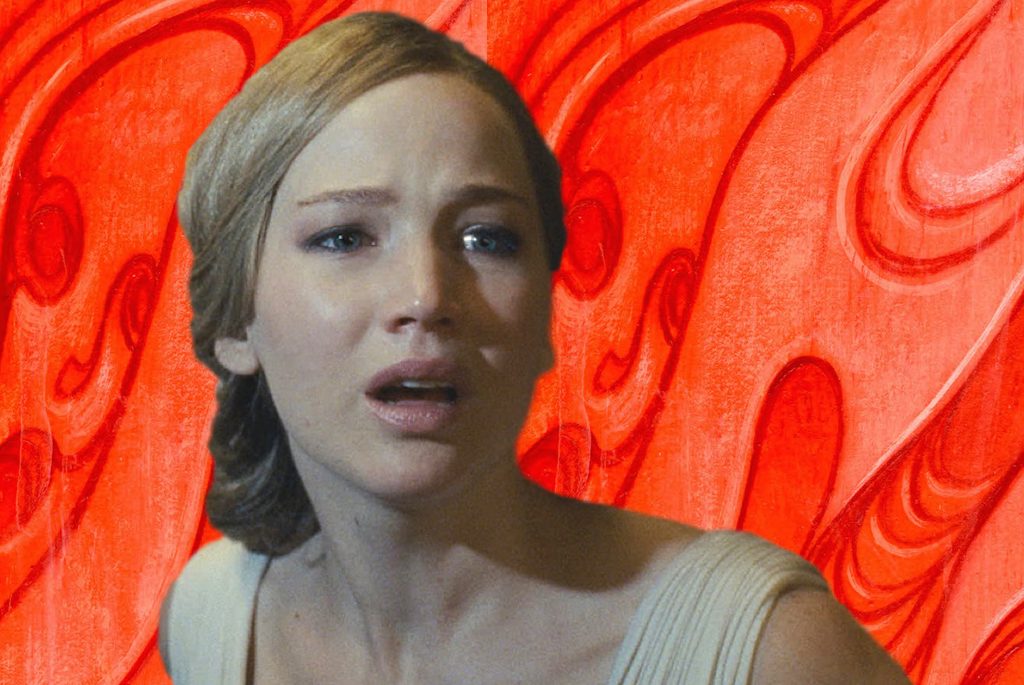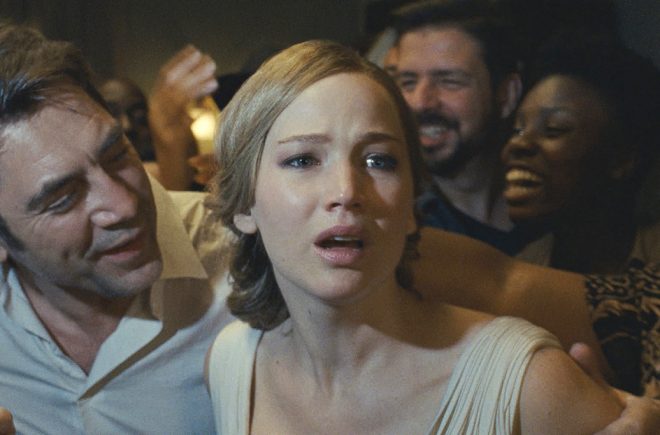Is ‘mother!’ Actually Worth The Pain?
This is a singular cinematic experience, but you might need to take a bath after watching it.

mother! is not fucking around. This is a film that well and truly earns its exclamation mark.
Initially quiet, unnerving scenes of Jennifer Lawrence and Javier Bardem plodding around a rickety house soon explode into an anxiety-inducing eruption of chaos. It’s exhilarating. It’s horrifying. It’s the closest mainstream cinema has gotten to ‘extreme cinema’ in years. That something this fucking extravagant and ambitious and misshapen has made its way into blockbuster cinemas is legitimately astonishing.
It’s been a long time since I’ve seen audiences hate a movie as much as they hate #Mothermovie . It joins the exclusive F CinemaScore club.
— Austin (@AustinCTweets) September 16, 2017
First reaction to MOTHER!: People are going to watch this movie on dates. *First* dates! That's my favorite part.
— Matt Singer (@mattsinger) September 15, 2017
It’s less of a surprise, admittedly, if you’re familiar with the work of director Darren Aronofsky, who made his mark with nerve-shredding psychological horror like Requiem for a Dream and Black Swan. Aronofsky is divisive. He’s clearly an auteur, with an unmistakably recognisable aesthetic.
But where other arthouse directors construct their films with subtlety and sophistication, Aronofsky instead opts for savagery and sensory overload. That’s easy to hate. But if, like me, you like your movies unique and unmistakably messy, he’s also easy to love.

mother! is certainly messy — in a way that differs from his other work. Love them or hate them, Aronofsky’s films have relatively straightforward loglines. Black Swan: an artist’s ambition pushes her to the brink of insanity. The Wrestler: an athlete’s ambition pushes him to his physical limits. The Fountain: grief is a complicated journey of forgiveness and self-discovery. Requiem for a Dream: drugs are bad, mmkay. Pi: maths is scary. Noah: be vegan.
This kind of thematic clarity buoys the director’s best films and drags down his worst ones. With mother!, he opts for something that’s messy in form and theme alike. Undergrad film students are going to love mother! because it’s the kind of puzzle-box movie that invites many distinct readings. It’s explicitly figurative, but precisely what metaphor it’s reaching for will vary from viewer to viewer. (As Little White Lies’ David Jenkins puts it, the film’s a “Rorschach blot made of menstrual blood”.) You could comfortably bang out a couple thousand words arguing any of the following:
— mother! is a film about the relationship between artist and creation. Bardem’s character — a poet — has an all-consuming need to create (children, poetry, a home), but that impulse curdles into destruction; destruction disproportionately visited on his wife, played by Lawrence. (Each is only credited as ‘Him’ and ‘Mother’) Depending on your perspective, it’s a film that excoriates or celebrates the solipsism of Great Men.
— Or, actually, mother! is a film about how relationships are poisoned by toxic masculinity. Lawrence’s good-natured wife is ignored and silenced in the shadow of Bardem’s towering ego, and the climactic chaos represents the dissolution of their relationship and/or how power imbalance can slide towards abuse.

— Turns out mother! is a metafictional interrogation of ‘hysterical women’ films. Films like Polanski’s Rosemary’s Baby and Repulsion, Bergman’s Persona, Ross Perry’s Queen of Earth or Aronofsky’s own Black Swan. Films where cinema is synonymous with the suffering of women and the dissolution of their identity — films invariably written and directed by men. Lawrence is subject and creation, creator and victim.
— No, mother! is actually influenced by Luis Buñuel’s surrealistic satire of society and, especially, Catholicism. Mysterious houseguests Michelle Pfieffer and Ed Harris are Adam and Eve, breaking rules and spawning violent sons. Bardem is God, attracting zealous followers and mimicking the rituals of Catholicism, from Ash Wednesday markings to a particularly gruesome take on the Eucharist. Lawrence is Mother Earth and Mary, divine and defiled and doomed to suffer.
I could go on, but you get the point. Breaking up mother! into its constituent parts to argue for one particular reading seems to miss the point for me, though. This is a film you have to experience.
And, boy, is it an experience. I can remember how I felt after my first viewing of Requiem for a Dream: rattled and drained like I’d suffered through genuine trauma myself. mother! recreates that feeling. It’s a brutal, often unpleasant, occasionally unintentionally-hilarious watch throughout its hyperbolic final act.
I’m not necessarily convinced the film boasts a coherent message, or even an impressive aesthetic. Matthew Libatique’s cinematography, constructed around dizzyingly oppressive close-ups, is technically formidable without striking me as especially original. But I can’t help but be impressed by how Aronofsky — even more so than in Black Swan or Requiem for a Dream — creates a full-throated evocation of a panic attack. I found the film a properly gruelling physical experience, and if the audience around me — who were visibly recoiling or clutching at their arms throughout — is anything to go by, I’m far from alone.
Like walking away from a bone-shaking rollercoaster ride, I can’t quite make up my if I liked mother! or not, but it’s undeniable a uniquely memorable experience. It’s not the kind of film you can in good conscience recommend, because people are going to have violently negative reactions to it. Those negative reactions won’t necessarily be unjustified. This is a film that markets itself with the face of one of modern Hollywood’s biggest stars, yet Jennifer Lawrence fans will find themselves watching the actress suffer for over two hours.
mother! is a singular cinematic experience, but you might need to take a bath afterwards.
Cinema constructed around the aestheticisation of female suffering isn’t new. It isn’t always a bad thing: the aforementioned Repulsion is a masterpiece. But there’s something discomfiting about the way mother! depicts the anguish inflicted upon Lawrence’s form. While the film is supposed to be sympathetic to her character’s plight, towards the back half the perspective shifted; it no longer felt like a masochistic evocation of anxiety and disempowerment, but something more sinister, more sadistic. It felt like something that revelled in Lawrence’s pain.
Lawrence delivers one of her best performances here. She finds a cautious balance between muted unease and all-out hysteria that reminds us of her talent. But at times it’s hard not to wonder how much of her on-screen suffering is feigned and how much is genuine. Between Shelley Duvall in The Shining or Maria Schneider in Last Tango in Paris, Hollywood certainly has a history with it. I don’t mean to deny Lawrence’s agency by suggesting that her work is evidence of anything but her acting ability. But when you read that the actress “hyperventilated so much [on set] that she dislocated her rib”, it’s hard not to feel a little disturbed.
Aronofsky — (48), who also formed a relationship with Lawrence (27) on set — has undeniably created a viscerally upsetting film, and that’s surely his intent. But some scenes — as when Lawrence is stripped naked and assaulted while her assailants spit misogynistic insults at here — feel like they cross a line into exploitation. However you interpret the film, I’m not convinced there’s enough substance here to justify how it luxuriates in Lawrence’s pain. mother! is a singular cinematic experience, but you might need to take a bath afterwards.
–
mother! is in cinemas now.
–
Dave Crewe is a Brisbane-based teacher and freelance film critic who spends way too much of his time watching movies. Read his stuff at ccpopculture or pester him at @dacrewe.